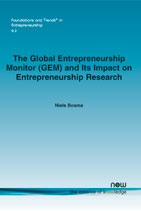The Global Entrepreneurship Monitor (GEM) and Its Impact on Entrepreneurship Research
By Niels Bosma, Utrecht University School of Economics & Global Entrepreneurship Research Association and Vlerick Business School, The Netherlands, N.S.Bosma@uu.nl
Abstract
The Global Entrepreneurship Monitor (GEM) is a project carried out by a research consortium dedicated to understanding the relationship between entrepreneurship and national economic development. Since 1999 GEM reports have been a key source of comparable data across a large variety of countries on attitudes toward entrepreneurship, start-up and established business activities, and aspirations of entrepreneurs for their businesses. The growing databases increasingly allow for in-depth academic research and this is mirrored by the rapidly increasing amount of GEM-based scientific publications in a wider range of academic journals. At this point it is appropriate to provide an overview on these publications, to summarize their main contributions, and to provide some directions for obtaining promising GEM-based academic contributions in the future. This publication provides a review of 89 GEM-based academic publications in SSCI-listed journals since 2004, with the objectives to highlight the particular advantages of GEM data, their quality and usability, as well as their limitations. It also recommends a number of ways in which the GEM project might evolve further and make more impact on entrepreneurship research, on entrepreneurship policy and practice, and ultimately on getting more grip on the complex relation between entrepreneurship and economic development.
The Global Entrepreneurship Monitor (GEM) and Its Impact on Entrepreneurship Research
The Global Entrepreneurship Monitor (GEM) and its Impact on Entrepreneurship Research reviews the academic contributions of the GEM project since its inception. Starting with a basic overview of the GEM methodology in Chapter 2, Chapters 3 to 5 review all 89 identified GEM-based empirical papers that have been published in journals that are listed in the Social Science Citation Index (SSCI). These contributions are categorized along the main GEM objectives. Chapter 6 concludes and provides suggestions for future GEM-based research.
